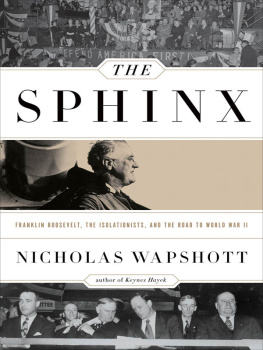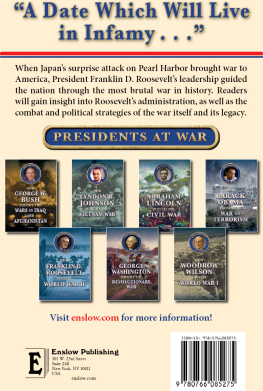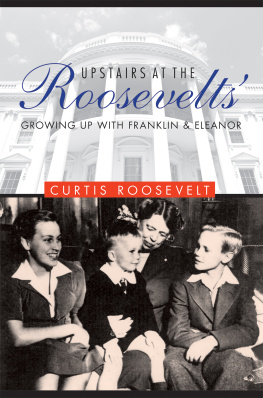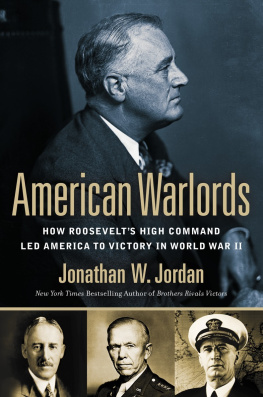
THE
SPHINX
Franklin Roosevelt, the Isolationists,
and the Road to World War II
NICHOLAS WAPSHOTT

To
William
and Oliver
CONTENTS
How Franklin Roosevelts cryptic character
led him to be dubbed the Sphinx.
IF YOU TRAVEL NORTH from New York City along the east bank of the Hudson River, you will before long come to Hyde Park House, Franklin Roosevelts country home, preserved more or less as he left it on his death in 1945. Among the exhibits displayed in a glass case in his presidential library is an eight-foot-tall papier-mch sculpture of a sphinx. The mythical Egyptian creature with a lions body, the wings of a bird, and a human head whose cryptic smile defied translation bears Roosevelts face, complete with pince-nez spectaclesa nod to his fifth cousin Theodore, the Republican presidenthis trademark cigarette holder and smoldering cigarette, and his narrowed, smiling eyes above a broad grin.
The statue was commissioned as a joke by the Gridiron Clubs White House correspondents as a satirical centerpiece for their annual dinner in December 1939, attended by the president as principal honored guest. The purpose of portraying Roosevelt as a sphinx was to let it be known to the president that the press were flummoxed by his persistent reluctance to make clear whether he would run for reelection in the contest of November 1940. Roosevelts ambiguity on the subject had become almost as much a story as whether he would run. Roosevelt so enjoyed the sphinx joke that he immediately acquired the sculpture and had it shipped to Hyde Park to adorn the nascent library that would mark his presidency.
For years, the president had dodged and weaved on the question of whether he would run. He had told some friends he was ready to retire to become a gentleman farmer at Hyde Park. To muddy the waters, he had encouraged many unsuitable and unelectable Democrats to throw their hats in the ring to succeed him. He had told others that he had simply not made up his mind. No one, not even his wife, Eleanor, nor his mother, Sara, knew which way he would jump. The sphinx in the White House was unfathomable. And the longer he wavered, the less chance there was that any rival could raise the funds to challenge him.
Roosevelts sphinx-like inscrutability was typical of him. Throughout his life, he had adopted a studied ambiguity about almost every aspect of his life, both political and personal. Born into wealth and living in a grand house surrounded by a large country estate, he was in most respects a conventional New York aristocrat. He was educated at Groton School, the Episcopalian boarding school for the sons of the well-to-do considered the most exclusive school in the whole of the United States, then Harvard University, making him a standard product of Americas white Anglo-Saxon Protestant governing elite. He was an athletic man of action. His boundless energy and personal confidence, underpinned by an annual trust fund income of $120,000 ($1.6 million in 2014 terms), lifted him above the less driven bluebloods with whom he shared his privileged background.
Yet his political views were far from usual for a young man of his elevated social status. While his dashing distant older relation Theodore had been a Republican president, albeit of a progressive sort, and had encouraged his young protg to enter politics, Franklin followed his father into the Democratic Party. His early steps on the political ladder in New York meant having to overcome the natural conservatism and innate Republicanism of the country people in Dutchess County and persuade them that, despite his Democratic leanings, he would look after them as any good patrician would.
He smothered the traditional upstate voters suspicion of his upper-class manners and upper-class demeanor by exercising the quality that would eventually lead him to inhabit the White House: an effortless and irresistible personal charm. In addition, he was physically attractive and approached those less fortunate than himself with an easy, agreeable manner. His biographer Conrad Black described Roosevelt at this time as slender, clean-shaven, mellifluous, and prone to make his points with a debonair wave of his cigarette-holder.
Upon this secure social foundation Roosevelt established an unlikely political career, which, by the time of World War One, saw him as assistant secretary of the navy in Woodrow Wilsons administration. Alongside him was Theodore Roosevelts niece Eleanor. When Theodore had given her away at their wedding ceremony, on St. Patricks Day, March 17, 1905, he had cracked, Theres nothing like keeping the name in the family. But, as with everything else about him, Franklin Roosevelts marriage and his romantic and sexual life was a study in equivocation. There was little doubt he loved Eleanor as a wife. They had six children together, and to all outward views it was a perfect marriage.
Yet Franklins eye wandered, often little further than toward distant members of the Roosevelt family who were recruited ostensibly to help him run his private office, and it wandered repeatedly. His sexual drive was so insistent that not even the polio he contracted at age thirty-nine, while summering at the familys vacation home on the Canadian island of Campobello in 1921, brought his womanizing to a halt. Paralyzed from the waist down, in permanent discomfort, unable to walk unless his legs were reinforced with iron calipers, and largely confined to a wheelchair, he still found a way to both woo women and commit adultery with them.
Roosevelts philandering took place with the tacit consent, if not approval, of Eleanor. In September 1917, while unpacking her husbands suitcase, she stumbled upon love letters from Lucy Page Mercer, her social secretary, and the marriage was thrown into disarray. Betrayed and bruised, the strong-willed Eleanor made her husband an uncompromising and nonnegotiable offer: he must abandon his mistress forthwith and appear a devoted husband or face divorce. The loving marriage was irrevocably broken, but Eleanor was prepared to allow it to seem intact for the sake of her five children. Rather than abandon his soaring political career, Franklin accepted Eleanors conditions. To please his long-suffering wife, he agreed to allow her to follow an independent course and establish a public career of her own.
It was a bargain Roosevelt was in no position to refuse if he was to pursue his ambition: to follow Theodore Roosevelt into the White House. A sex scandal and a conspicuous divorce would have stopped Franklin in his tracks. His affair with Mercer turned out to be a turning point in a marital arrangement that was always as much dynastic as a love match. What became one of the most powerful marriages in American history was forged in the heat of adultery into a formidable personal and political alliance.
The ambiguity at the core of his marriage was echoed through his politics. While his views were liberal, to maximize his appeal he liked to appear a political chameleon, blending in with whomever he needed to please in order to move on to the next stage in his ambitions. His country neighbor and eventual close government colleague Henry Morgenthau had learned that when Roosevelt said he was 100 percent behind an idea, it meant nothing. The differences between what Roosevelt thought, what he said, and what he did were quite distinct.
So long as Theodore Roosevelt was alive, Franklin was under his sway. After Wilson took the United States into World War One on the Allied sideafter a German U-boat torpedoed an American passenger ship, the Housatonic , off the Isles of ScillyTheodore, much to Eleanors fury, tried to persuade Franklin to resign his post and get into uniform at once. A similar stunt leading the all-volunteer Rough Riders in the SpanishAmerican War of 1898 had transformed Theodore into a nationally known, swashbuckling war hero, and he felt Franklin should follow suit.
Next page






